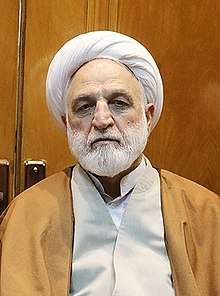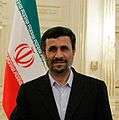Gholam-Hossein Mohseni-Eje'i
Gholam-Hossein Mohseni-Eje'i (Persian: غلامحسین محسنی اژهای, Persian pronunciation: [ɢolɒːmhosejne mohsenije eʒei]; born 1956) is an Iranian conservative politician, jurist and prosecutor who currently serves as the second-highest official in the Judicial system of Iran.
Gholam-Hossein Mohseni-Eje'i | |
|---|---|
 | |
| First Vice Chief Justice of Iran | |
| Assumed office 23 August 2014 | |
| Appointed by | Sadeq Larijani |
| Preceded by | Ebrahim Raisi |
| Spokesman of the Judicial system of Iran | |
| In office 16 September 2010[1] – 8 April 2019 | |
| Appointed by | Sadeq Larijani |
| Preceded by | Alireza Jamshidi |
| Succeeded by | Gholam-Hossein Esmaili |
| Attorney-General of Iran | |
| In office 24 August 2009 – 23 August 2014 | |
| Appointed by | Sadeq Larijani |
| Preceded by | Ghorbanali Dorri-Najafabadi |
| Succeeded by | Ebrahim Raisi |
| 6th Minister of Intelligence | |
| In office 24 August 2005 – 26 July 2009 | |
| President | Mahmoud Ahmadinejad |
| Preceded by | Ali Younesi |
| Succeeded by | Mahmoud Ahmadinejad (Acting)[2] |
| Personal details | |
| Born | 1956 (age 63–64) Isfahan, Iran |
| Alma mater | Haghani Seminary |
He was the minister of intelligence from 2005 to July 2009, when he was abruptly dismissed. He has also held a number of governmental posts since 1984. Currently he is the first deputy of the Chief Justice of Iran.
Early life and education
Gholam Hossein Mohseni-Ejehei was born in Ezhiyeh, Isfahan, Iran in 1956.[3] He is a graduate of the Haqqani school in Qom[4] and one of his teachers was Mesbah Yazdi.[5][6] He also received a master's degree in international law from the Haqqani school.[7]
Career
Mohseni-Eje'i served as Head of the Ministry of Intelligence's Select Committee from 1984 to 1985. He was then Representative of the Head of Judiciary to the Ministry of Intelligence (1986–88). From 1989 to 1990, he served as Head of the Prosecutor’s Office for economic affairs. Next, he held the post of Representative of the Head of Judiciary to the Ministry of Intelligence, from 1991 to 1994. His next post was Prosecutor of the Special Clerical Court, which he held from 1995 to 1997. He was appointed Minister of Intelligence on 24 August 2005 after securing 217 votes in his favor at the Majlis.[8] He was in office until 26 July 2009, when he was abruptly dismissed.[5] No reason was given for his dismissal,[9] but it was thought to be connected to his opposition to the appointment of Esfandiar Rahim Mashaei as first vice-president.[5]
Shortly after his dismissal, on 24 August 2009, he was appointed Prosecutor general of Iran by the Head of Judiciary, Ayatollah Sadeq Larijani,[10][11] replacing Ghorbanali Dorri-Najafabadi.[11]
Activities and views
On 15 July 2009, Mohseni-Ejehei told reporters that his ministry might publicize confessions made by people held for weeks without access lawyers. He said "The confessions obtained from those arrested could be made public, should the Judiciary decide to air their remarks." Human rights activists raised concerns that "these so-called confessions are obtained under duress."[12]
After his dismissal, president Mahmoud Ahmadinejad praised Mohsen-Eje'i as a good human being but said his removal was necessary as the ministry needed huge changes to cope with the situation. He further said if the ministry had done its job properly, there would not have been post-election bloody riots in which some people died, but he stopped short of criticizing Mohseni-Eje'i as responsible for them.[13]
According to Stratfor, Mohseni-Eje'i is a conservative hardliner affiliated with hardline cleric Mohammad Yazdi.[14]
Mohsen-Eje'i has indicated he would welcome alternative punishments to the death penalty for some drug traffickers, if these alternatives proposed by teachers were more effective punishments than the death penalty. But he stated that, so far, critics of the death penalty in Iran have not offered alternatives that would deal effectively with Iran's drug gangs.[15]
See also
- Chain Murders of Iran
References
- http://donya-e-eqtesad.com/news/623280
- Abbas Milani (3 August 2009). "Inside The Civil War That's Threatening The Iranian Regime". New Republic. Retrieved 3 June 2016.
- "Iran: President Mahmoud Ahmadinejad presented his cabinet". Caucaz Europenews. 14 August 2005. Retrieved 21 July 2009.
- Shmuel Bar; Shmuel Bacher; Rachel Machtiger (January 2008). "Iranian nuclear decision making under Ahmedinejad" (PDF). Lauder School of Government. Retrieved 29 August 2013.
- Sahimi, Muhammad (26 July 2009). "Ahmadinejad Sacks Ministers; Mashaei to Remain Close". PBS. Retrieved 1 July 2013.
- David E. Thaler; Alireza Nader; Shahram Chubin; Jerrold D. Green; Charlotte Lynch; Frederic Wehrey (2010). "Factionalism and the Primacy of Informal Networks". Mullahs, Guards, and Bonyads (PDF). Santa Monica: RAND Corporation. Retrieved 29 July 2013.
- Yonah Alexander; Milton M. Hoenig (2008). The New Iranian Leadership: Ahmadinejad, Terrorism, Nuclear Ambition, and the Middle East. Greenwood Publishing Group. p. 41. ISBN 978-0-275-99639-0. Retrieved 13 August 2013.
- "Iran: 17 proposed ministers receive votes of confidence, 4 rejected". Payvand. 25 August 2005. Retrieved 1 July 2013.
- "Iran intelligence minister sacked". BBC News. 26 July 2009. Retrieved 26 July 2009.
- Iran's sacked minister appointed as prosecutor general. 25 August 2009
- "Iran's sacked minister named top prosecutor". Al Arabiya. 24 August 2009. Retrieved 1 July 2013.
- "Iran: Stop 'Framing' Government Critics". Human Rights Watch. 21 July 2009. Retrieved 21 July 2009.
- "فارسی - ايران - احمدی نژاد تغییر وزیر اطلاعات را به ناآرامی ها ارتباط داد". BBC. 20 August 2009. Retrieved 29 July 2013.
- Staff writer(s); no by-line. (27 July 2009). "Crisis as opportunity for the IRGC". Stratfor. Archived from the original on 5 August 2009. Retrieved 1 August 2009.
- Staff author(s). No by-line. (22 June 2016). "حقوق ماهانه 40 میلیونی برای 50 نفر از مدیران یک وزارت خانه" [The monthly salary is 40 million for 50 members of Ministry]. Islamic Republic of Iran Broadcasting News (in Persian). Retrieved 22 June 2016.
External links
| Wikinews has related news: |
| Wikiquote has quotations related to: Gholam-Hossein Mohseni-Eje'i |
| Wikimedia Commons has media related to Gholam-Hossein Mohseni-Eje'i. |
- 18 of Iran’s 21 new ministers hail from Revolutionary Guards, secret police with a photograph of Mohseni-Ejehei
- Mohseni Ezhei: From Inquisitor to Minister of Information
| Political offices | ||
|---|---|---|
| Preceded by Ali Younessi |
Minister of Intelligence 2005–2009 |
Succeeded by Heydar Moslehi |
| Legal offices | ||
| Preceded by Ghorbanali Dorri-Najafabadi |
Attorney-General of Iran 2009–2014 |
Succeeded by Ebrahim Raeesi |


